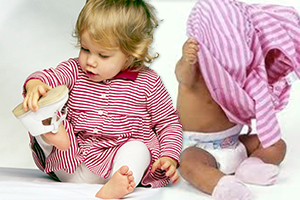How to help your child become more independent?

Imagine a situation: it’s 7:55 a.m. You were supposed to be on your way to preschool 10 minutes ago. But your child is still in her pajamas! What can you do if the bell in the preschool rings in 15 minutes and you definitely don’t want to be late again? You desperately pull her PJ’s off as if it’s on fire and put on first you can grab from the closet, simultaneously trying to do her hair. Even though you know she could manage get dressed by herself but it’s unbearable to watch her struggling with pants, buttons and laces.
Such ordinary situations are not as harmless as they seem to be. If parents tend to do everything for their precious little ones (so-called “helicopter parents”), kids may grow up helpless and even afraid of independence. If you don’t want to complain about children’s ineptitude and unfitness for adult life, it’s better to teach them independence since early childhood as little ones gladly copy adults’ behavior during their first years of life.
Be patient. Sure it’s faster and easier to dress the kid and feed her yourself instead of waiting a good hour while she is dealing with the meal like a snail. If you know that it takes 10 minutes for your child to put on the pants in the morning just start your day 10 minutes earlier. And remember that kids learn faster when you don’t rush and scold them.
Let kids make decisions. For example, let your children decide what shirt to put on even if you think it doesn’t match the pants or skirt. Even if she insists on going to preschool in her Halloween costume or in the rabbit-slippers. Request your kid’s input and advice on small tasks. Let her choose what she wants for dinner but provide her with healthy selection (not candies and ice-cream). When you cook or clean the house let your little one assist you, especially if she shows interest in what you’re doing. However, you should also make sure that kids know the limits.
Ask her to do things and establish chores. Make a list of things that your kid will be able to do independently. By the age of 2-3 years children can already do a number of them (with your little help): putting toys away, getting dressed, brushing teeth and washing face. For a five-year-old it shouldn’t be too hard to do these things without your assistance plus simple cleaning chores, feeding pets or watering plants.
Teach your children that it is okay to be separate. It may be stressful for kids to be alone even for 5 minutes. However if you want them to grow up as independent individuals you should teach them that it is okay to be separate. Establish me-time - leave your child alone busy with her activity (such as board games, toys or books with pictures) first for short periods of time. By doing so, she will learn that she is still safe without parents’ presence. Let her do things on her own but encourage her to ask for help when needed.
Set the example. It’s not enough just to say “Put your toys in the box”. Show her how to do it. Button up the top of the shirt and let the kid button up the second half. Walk the child through each step of bedtime routine or clearing her place at table for instance. Then watch her doing it independently and don’t forget about support and encouragement from your side. In a couple of weeks your precious little one will successfully brush her teeth, take a bath and put on her pajamas mainly on her own before bedtime.
Don’t expect perfection. Remember that she’s just learning how to do things. Don’t expect that she will instantly learn how to use spoon and fork, that she will be able to dress herself proficiently and fasten shoe-laces as Flash. She hasn’t got used to eating with a spoon by herself yet and her tiny fingers are not trained enough for fine motor movements. If she spills juice, don’t get mad; don’t criticize, but show her how to clean it up and assure her that it can happen to everyone.
Following these easy steps you will help your children gain independence and it will greatly contribute to their success in life.










